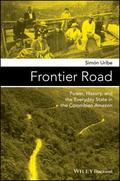Frontier Road
Power, History, and the Everyday State in the Colombian Amazon
Antipode Book Series

1. Edition July 2017
280 Pages, Hardcover
Wiley & Sons Ltd
Frontier Road uses the history of one road in southern Colombia--known locally as "the trampoline of death"--to demonstrate how state-building processes and practices have depended on the production and maintenance of frontiers as inclusive-exclusive zones, often through violent means.
* Considers the topic from multiple perspectives, including ethnography of the state, the dynamics of frontiers, and the nature of postcolonial power, space, and violence
* Draws attention to the political, environmental, and racial dynamics involved in the history and development of transport infrastructure in the Amazon region
* Examines the violence that has sustained the state through time and space, as well as the ways in which ordinary people have made sense of and contested that violence in everyday life
* Incorporates a broad range of engaging sources, such as missionary and government archives, travel writing, and oral histories
Acknowledgements ix
Introduction 1
Part I 19
1 Reyes' dream 21
2 A Titans' work 62
3 Fray Fidel de Montclar's deed 92
Part II 141
4 The trampoline of death 143
5 On the illegibility effects of state practices 182
6 The politics of the displaced 211
Conclusion: The condition of frontier 240
References 248
Index 264
Michael Taussig, Class of 1933 Professor of Anthropology, Columbia University, New York
'A wonderful historical treat in the emerging field of infrastructure studies, Frontier Road is a rich and fascinating account of the relation between state and frontier in the Putumayo region of Colombia. The protagonist is the road - a site of hope, frustration, violence and fear, and a space where histories of the future are tracked from the mid-nineteenth century to the present day.'
Penny Harvey, Professor of Social Anthropology, University of Manchester, Manchester
'Simón Uribe takes us on an exhilarating journey to reveal how nearly two centuries of frustrated efforts to build a road through the Putumayo exposes the fantasies of state-building and uncertainty of development. With this beautifully written ethnography, Uribe introduces us to a cast of actors, from enigmatic missionaries, wizened truck drivers, and 'never present' guerrilla for whom the road is material infrastructure and symbol of state power. Frontier Road is a remarkable achievement that itself exists at the intellectual frontier of anthropology, geography and history.'
Gareth Jones, Professor of Urban Geography, London School of Economics, London


